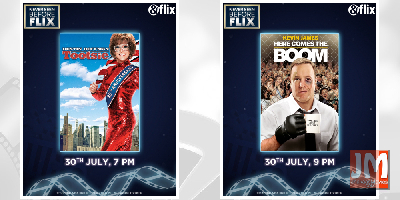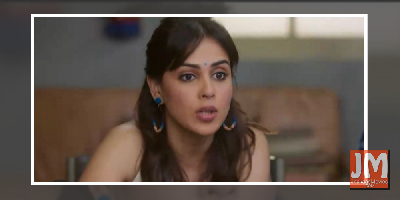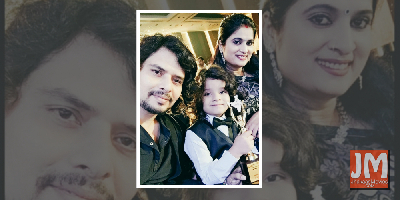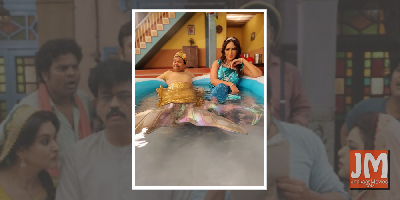 Aan Tiwari honoured with Best Child Actor award for Baal Shiv
Aan Tiwari honoured with Best Child Actor award for Baal Shiv Ghategi rahasymayi ghatnaye!
Ghategi rahasymayi ghatnaye! Amazon Prime Video unveils the 2021 Festive Line-up; brings a heady mix of Indian and International titles on the service
Amazon Prime Video unveils the 2021 Festive Line-up; brings a heady mix of Indian and International titles on the service Release: Music video of, Yeh Haalaath, from Mumbai Diaries 26-11
Release: Music video of, Yeh Haalaath, from Mumbai Diaries 26-11 Bhumi Pednekar feels she shares feel-good value with Akshay Kumar on screen
Bhumi Pednekar feels she shares feel-good value with Akshay Kumar on screen
Creativity off the shelf: Who needs writers!

BY VINOD MIRANI
When a new film is announced, it is mostly about who is remaking what South Indian film in Hindi! Have you seen any story/scriptwriter's name being mentioned prominently in the media or even in the film promotion material lately? Not really.
There is not a single writer in the Hindi film industry by whose name people would want to see a film, let alone sell a project, as it happened earlier when the names of Gulshan Nanda, Sachin Bhowmick, KA Narayan, Salim-Javed, being top names, helped a film sell. There were also others like Prayag Raj, KK Shukla, Kadar Khan, Pandit Mukhram Sharma, KA Abbas and Hrishikesh Mukherjee who instilled confidence in the investors as well as film distributors. In fact, producer BR Chopra employed a team of writers for each of his films and, in credits, the films did not single out any one writer. The story was credited to the BR Films Story Department. Like many producers, Manmohan Desai engaged two to three writers in each of his films, which turned out blockbusters. More writers helped bounce ideas and exchange views.
Yes, there are a few flash-in-the-pan kind who delivered critically acclaimed films that also did well commercially. These include, Juhi Chaturvedi, Honey Irani, Dibakar Banerjee, Tigmashu Dhulia, Abhijat Joshi, Gauri Shinde, Amole Gupte, Rajat Aroraa and a few others who come up with a hit or two. Their scripts are off the beaten track, and But, most of these are unconventional writers. They don't write what has always been known as formula film scripts -- not the kind of films big stars would agree to do, the kind touted to cross the crore mark.
In such an event, why this dearth of writers in Hindi films?
Is this because the writers lack in talent or it is the other way round? That the filmmakers don't encourage writers, don't pay their deserved price because of which the writers don't think it's worth their while. It would seem that the filmmakers don't want to devote time to the writing department.
The earlier practice was to have what was were described as Story Sittings. Sittings meant where the filmmaker, director and writer/s spent months on story sessions, bounced ideas to come up with a script that would look promising and a star would approve.
The filmmaker, the director and the writer even took to booking hotel rooms in Mumbai or, not to be disturbed, at some hill station to work on a plausible script till it became worth narrating to the stars.
There was also an era when the script and dialogue were written as the shooting went along. This happened a lot but one such case I remember is of the film "Joshilaay".
Shekhar Kapur was directing Sunny Deol and Anil Kapoor in the far-flung Leh in Ladakh. Javed Akhtar was the writer. The flight to Leh arrived only twice a week which, again, was cancelled often due to bad weather. Javed dispatched pages with dialogue written by air which, at most times, did not arrive leading to cancellation of shootings. Finally, Shekhar Kapur and his assistant of that time, Satish Kaushik, took to penning dialogue to complete the film's Leh schedule.
In fact, there were times when the stars were on the sets but the director had to wait for the writer to arrive.
Well, at least, we had writers worth waiting for at that time! Now, we don't, not the kind to wait for nor any other kind! The content dumped on the OTT viewers week after week bears witness to this fact. It is utterly below mediocre.
Earlier, the term used was respectable -- 'Inspired By' -- though, actually, the story was mostly stolen from a foreign film. Copying from Hollywood was common till it backfired on music composer-producer Hemant Kumar who produced "Kohraa" (1964) based on Alfred Hitchcock's "Rebecca" (1940).
For Hollywood studios, the Indian market hardly mattered where a film released long after its international release and it was limited to a few metros like Mumbai, Delhi, Kolkata, Chennai, with just one screen. So, who infringed on their copyrights was never known to them. But, this time, a local distributor who had earlier distributed Hemant Kumar's superhit film "Bees Saal Baad" (1962) ratted on Hemant Kumar. He had a grouse because he did not get rights for "Kohraa", which he expected to be as big a hit as "Bees Saal Baad". Hemant Kumar had to face consequences for the venture.
Hemant Kumar's intention may not have been to copy or steal the story. He may have just been convinced that this story needed to be told to the audience here. Ironically, Hemant Kumar was not the last maker to make this film in Hindi, others have done so after him.
Then came the era of copying from foreign films. But what followed was, thanks to the advent of digital era, the Cut and Paste culture. The copy masters had films to pick from just about every corner of the world. LCDs served as the story/screenplay. It became so blatant that a maker would approach a star and ask him to watch two LCDs saying, "These are part one and part two of the film I propose to make, and only you fit the character!" (Flattery usually worked.)
Thankfully, now it has become mandatory to acquire the rights even if one is remaking a foreign film and also acknowledge the fact in the credit titles.
Foreign films often backfired at the box office in adaptation, and making them acceptable to the all-India audience was tough. Also, they were short in duration and did not have songs -- an ingredient that was must in Indian films. In the process of adding songs and trying to make it palatable to our audience, they lost their grip.
So, now we are back to remaking South Indian films, which have either worked well at the box office or otherwise have caught the fancy of your star. From time to time, our stars also want to make a mark as good actor, box office notwithstanding. So, they go for some unconventional South remake.
Among the South languages, Malayalam films were the most contemporary. Remakes were avoided for this reason. Now, they are in demand for remake rights. In fact, according to reports, there at least six Malayalam films slated for remake, namely Drishyam 2, Forensic, Mumbai Police, Anjaam Pathiraa, Helen and Ayyappanum Koshiyum.
Telugu language films have always worked well with the Hindi audience and earlier too remakes were usually based on Telugu hits. A few that are likely to be remade in Hindi are: HIT: The First Case, Dear Comrade, RX100, Jersey, besides Tamil films Kaithi, Kolamavu Kokila and Thadam, Master, Ratsasan, Rocky, Aruvi, and Nakshatra Tharattu, besides the Kannada films Dia and Malyalam Nayattu.
Public notices of remake rights appear in a trade paper on a regular basis!
So, where are the Hindi writers, why can't we write original scripts? It could be that every filmmaker is in a rush to make a film and doesn't want to spend time on Story Sittings. What if the star rejected a project after all those months spent on writing? Might as well show him the ready stuff one after the other and let him choose. Once the star is with you, so are the distributors and the financer. Finally, it was the corporate houses that cared for a star-studded project which they sanctioned to producers with contacts with stars, rather than back content. (In the process, even film music has been neglected.)
You need an able writer even to justify a remake, you just can't rehash a regional film. No wonder, films nowadays lack the soul and fail to touch the viewer.
(Vinod Mirani is a veteran film writer and box office analyst. The views expressed are personal)
Tags: Cinema, Showbiz, Lifestyle, Fashion, Quote Unquote








